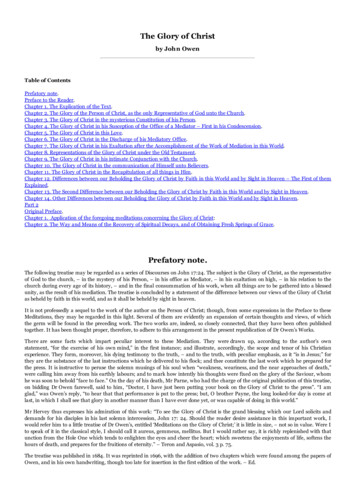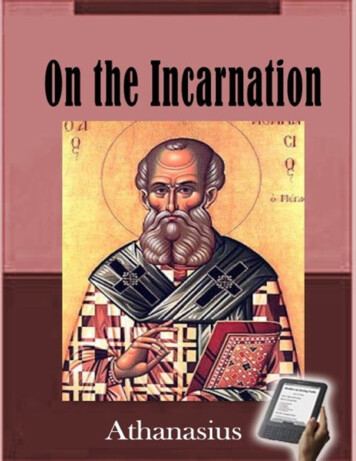
Transcription
All Things For Goodby Thomas WatsonTable of ContentsIntroductionThe Bezt Things Work for God for the GodlyThe Worst Things Work for GoodWhy All Things Work for GoodOf Love to GodThe Tests of Love to GodAn Exhortation to Love GodEffectual CallingExhortations to Them that are CalledConcerning God's Purpose"And we know that all things work together for good to those who loveGod, to those who are the called according to His purpose." Romans 8:28IntroductionChristian Reader,There are two things, which I have always looked upon as difficult. The
one is—to make the wicked sad; the other is—to make the godly joyful.Dejection in the godly arises from a double spring: either because theirinward comforts are darkened, or their outward comforts are disturbed.To cure both these troubles, I have put forth this ensuing treatise, hoping,by the blessing of God, that it will buoy up their desponding hearts, andmake them look with a more pleasant aspect. I would prescribe them totake, now and then, a little of this Cordial: "all things work together forgood to those who love God." To know that nothing hurts the godly, is amatter of comfort; but to be assured that all things which fall out shallcooperate for their good, that their crosses shall be turned into blessings,that showers of affliction water the withering root of their grace andmake it flourish more—this may fill their hearts with joy until they runover! If the whole Scripture be the feast for the soul (as Ambrose says)—thenRomans 8 may be a dish at that feast, and with its sweet variety may verymuch refresh and animate the hearts of Gods people. In the precedingverses the apostle had been wading through the great doctrines ofjustification and adoption, mysteries so arduous and profound, thatwithout the help and conduct of the Spirit, he might soon have wadedbeyond his depth. In this verse the apostle touches upon that pleasantstring of consolation, "we know that all things work together for good, tothose who love God." Not a word but is weighty; therefore I shall gatherup every filing of this gold, that nothing will be lost.In the text there are three general branches.First, a glorious privilege. All things work for good.Second, the people interested in this privilege. They are doubly specified.They are lovers of God, they are called.Third, the origin and spring of this effectual calling, set down in thesewords, "according to His purpose."I. First, the glorious PRIVILEGE. Here are two things to be
considered:1. The certainty of the privilege—"We know."2. The excellency of the privilege—"All things work together for good."1. The CERTAINLY of the privilege: "We know." It is not a matterwavering or doubt. The apostle does not say, "We hope, or conjecture.""We know that all things work for good." Hence observe that the truths ofthe gospel are evident and infallible.A Christian may come not merely to a vague opinion, but to a certainty ofwhat he holds. As axioms and aphorisms are evident to reason, so thetruths of true religion are evident to faith. "We know," says the apostle.Though a Christian has not a perfect knowledge of the mysteries of thegospel—yet he has a certain knowledge. "We see through a glass darkly"(1 Cor. x3:12), therefore we have not perfection of knowledge; but "webehold with open face" (2 Cor. 3:18), therefore we have certainty. TheSpirit of God imprints heavenly truths upon the heart, as with the pointof a diamond. A Christian may know infallibly that there is an evil in sin,and a beauty in holiness. He may know that he is in the state of grace."We know that we have passed from death to life" (1 John 3:14).He may know that he shall go to heaven. "We know that if our earthlytabernacle were dissolved, we have a building of God, a house not madewith hands, eternal in the heavens" (2 Cor. 5:1). The Lord does not leaveHis people at uncertainties in matters of salvation. The apostle says, "Weknow. We have arrived at a holy confidence. We have both the Spirit ofGod, and our own experience, setting seal to it."Let us then not rest in skepticism or doubts—but labor to come to acertainty in the things of religion. As that martyr woman said, "I cannotdispute for Christ—but I can burn for Christ." God knows whether wemay be called forth to be witnesses to His truth; therefore it concerns usto be well-grounded and confirmed in it. If we are doubting Christians,we shall be wavering Christians. Whence is apostasy, but fromincredulity? Men first question the truth, and then fall from the truth.Oh, beg the Spirit of God, not only to anoint you, but to seal you (2 Cor.
1:22).2. The EXCELLENCY of the privilege. "All things work together forgood."This is as Jacob's staff in the hand of faith, with which we may walkcheerfully to the mount of God! What will satisfy or make us content, ifthis will not? All things work together for good. This expression "worktogether" refers to medicine. Several poisonous ingredients put together,being tempered by the skill of the apothecary, make a sovereign medicine,and work together for the good of the patient. So all God's providencesbeing divinely tempered and sanctified, do work together for the best tothe saints. He who loves God and is called according to His purpose, mayrest assured that everything in the world shall be for his good. This is aChristian's cordial, which may warm him—and make him like Jonathanwho, when he had tasted the honey at the end of the rod, "his eyes wereenlightened" (1 Sam. xiv. 27). Why should a Christian destroy himself?Why should he kill himself with care, when all things shall sweetlyconcur, yes, conspire for his good? The result of the text is this—all thevarious dealings of God with His children, do by a special providence turnto their good. "All the paths of the Lord are mercy and truth unto such askeep his covenant" (Psalm 25:10). If every path has mercy in it, then itworks for good.We shall consider, first, WHAT things work for good to the godly;and here we shall show that both the best things and the worst thingswork for their good. We begin with the best things.The BEST things work for good to the godly1. God's attributes work for good to the godly.(1). God's POWER works for good. It is a glorious power (Col. 1:11),and it is engaged for the good of the elect.God's power works for good, in supporting us in TROUBLE."Underneath are the everlasting arms" (Deut. 33:27). What upheld
Daniel in the lion's den? What upheld Jonah in the whale's belly? Whatupheld the three Hebrews in the furnace? Only the power of God! Is it notstrange to see a bruised reed grow and flourish? How is a weak Christianable, not only to endure affliction—but to rejoice in it? He is upheld bythe arms of the Almighty. "My strength is made perfect in weakness" (2Cor. 12:9).The power of God works for us by supplying our NEEDS. God createscomforts, when means fail. He who brought food to the prophet Elijah byravens, will bring sustenance to His people. God can preserve the "oil inthe cruse" (1 Kings x7:14). The Lord made the sun on Ahaz's dial go tendegrees backward: so when our outward comforts are declining, and thesun is almost setting, God often causes a revival, and brings the sun manydegrees backward.The power of God subdues our CORRUPTIONS. "He will subdue ouriniquities" (Micah 7:19). Is your sin strong? God is powerful, He willbreak the head of this leviathan. Is your heart hard? God will dissolve thatstone in Christ's blood. "The Almighty makes my heart soft" (Job 23:16).When we say as Jehoshaphat, "We have no might against this greatarmy"; the Lord goes up with us, and helps us to fight our battles. Hestrikes off the heads of those goliath lusts which are too strong for us!The power of God conquers our ENEMIES. He stains the pride, andbreaks the confidence of adversaries. "You shall break them with a rod ofiron" (Psalm 2:9). There is rage in the enemy,and malice in the devil—but omnipotence in God. How easily can He rout all the forces of thewicked! "It is nothing for you, Lord, to help" (2 Chr. xiv. 11). God's poweris on the side of His church. "Happy are you, O Israel, O people saved bythe Lord, who is the shield of your help, and the sword of your excellency"(Deut. 33:29).(2). The WISDOM of God works for good. God's wisdom is ouroracle to instruct us. As He is the mighty God, so also the Counselor(Isaiah 9:6). We are oftentimes in the dark, and, in intricate and doubtfulmatters, know not which way to take; here God comes in with light. "I willguide you with my eye" (Psalm. 32:8). "Eye," there, is put for God'swisdom. Why is it, that the saints can see further than the most quick-
sighted politicians? They foresee the evil, and hide themselves; they seeSatan's sophisms. God's wisdom is the pillar of fire to go before, andguide them.(3). The GOODNESS of God works for good to the godly. God'sgoodness is a means to make us good. "The goodness of God leads torepentance" (Romans 2:4). The goodness of God is a spiritual sunbeam tomelt the heart into tears. "Oh," says the soul, "has God been so good tome? Has He reprieved me so long from hell, and shall I grieve His Spiritany more? Shall I sin against God's goodness?"The goodness of God works for good, as it ushers in all blessings. Thefavors we receive, are the silver streams which flow from the fountain ofGod's goodness. This divine attribute of goodness brings in two sorts ofblessings. Common blessings: all partake of these, the bad as well as thegood; this sweet dew falls upon the thistle as well as the rose. Crowningblessings: these only the godly partake of. "Who crowns us with lovingkindness" (Psalm 103. 4). Thus the blessed attributes of God work forgood to the saints.2. The PROMISES of God work for good to the godly.The promises are God's bank notes. The promises are the milk of thegospel; and is not the milk for the good of the infant? They are called"precious promises" (2 Pet. 1:4). They are as cordials to a soul that isready to faint. The promises are full of virtue.Are we under the guilt of sin? There is a promise, "The Lord ismerciful and gracious" (Exod. 34:6), where God as it were puts on Hisglorious embroidery, and holds out the golden scepter, to encourage poortrembling sinners to come to Him. "The Lord is merciful and gracious."God is more willing to pardon—than to punish. Mercy does moremultiply in Him, than sin in us. Mercy is His nature. The bee naturallygives honey; it stings only when it is provoked. "But," says the guiltysinner, "I cannot deserve mercy." Yet He is gracious: He shows mercy,not because we deserve mercy—but because He delights in mercy. Butwhat is that to me? Perhaps my name is not in the pardon. "He keepsmercy for thousands!" The treasury of mercy is not exhausted. God has
treasures lying by, and why should not you come in for a child's part?Are we under the defilement of sin? There is a promise working forgood. "I will heal their backslidings" (Hos. 14:4). God will not only bestowmercy—but grace. And He has made a promise of sending His Spirit(Isaiah 44:3), which for His sanctifying nature, is in Scripture comparedsometimes to water—which cleanses the vessel; sometimes to the fan—which winnows corn, and purifies the air; sometimes to fire—whichrefines metals. Thus the Spirit of God shall cleanse and consecrate thesoul, making it partake of the divine nature.Are we in great trouble? There is a promise which works for our good,"I will be with him in trouble" (Psalm 91. 15). God does not bring Hispeople into troubles, and leave them there. He will stand by them; He willhold their heads and hearts when they are fainting. And there is anotherpromise, "He is their strength in the time of trouble" (Psalm 37:39). "Oh,"says the soul, "I shall faint in the day of trial." But God will be thestrength of our hearts; He will join His forces with us. Either He willmake His hand lighter—or our faith stronger!Do we fear outward needs? There is a promise. "Those who seek theLord shall not lack any good thing" (Psalm 34:10). If it is good for us, weshall have it; if it is not good for us, then the withholding of it is good. "Iwill bless your bread and your water" (Exod. 33:25). This blessing falls asthe honey dew upon the leaf; it sweetens that little we possess. Let melack the venison, so I may have the blessing. But I fear I shall not get alivelihood? Peruse that Scripture, "I have been young, and now am old—yet have I not seen the righteous forsaken, nor his seed begging bread"(Psalm 37:25). How must we understand this? David speaks it as his ownobservation; he never beheld such an eclipse, he never saw a godly manbrought so low that he had not a bit of bread to put in his mouth. Davidnever saw the righteous and their seed lacking. Though the Lord mighttry godly parents a while by need—yet not their seed too; the seed of thegodly shall be provided for. David never saw the righteous begging bread,and forsaken. Though he might be reduced to great straits—yet notforsaken; still he is an heir of heaven, and God loves him.Question. How do the promises work for good?
Answer. They are food for faith; and that which strengthens faith worksfor good. The promises are the milk of faith; faith sucks nourishmentfrom them, as the child from the breast. "Jacob feared exceedingly" (Gen.32:7). His spirits were ready to faint; now he goes to the promise, "Lord,you have said you will do me good" (Gen. 32:12). This promise was hisfood. He got so much strength from this promise, that he was able towrestle with the Lord all night in prayer, and would not let Him go untilHe had blessed him.The promises also are springs of joy. There is more in the promises tocomfort—than in the world to perplex. Ursin was comforted by thatpromise: "No man shall pluck them out of my Father's hands" (John10:29). The promises are cordials in a fainting fit. "Unless your word hadbeen my delight, I had perished in my affliction" (Psalm 119:92). Thepromises are as cork to the net, to bear up the heart from sinking in thedeep waters of distress!3. The MERCIES of God world for good to the godly.The mercies of God humble. "Then King David went in and sat beforethe Lord and prayed, "Who am I, O Sovereign Lord, and what is myfamily, that you have brought me this far?" (2 Sam. 7:18). Lord, why issuch honor conferred upon me, that I should be king? That I whofollowed the sheep, should be king over Your people? So says a graciousheart, "Lord, who am I, that it should be better with me than others? ThatI should drink of the fruit of the vine, when others drink, not only a cup ofwormwood—but a cup of blood (or suffering to death). Who am I, that Ishould have those mercies which others lack, who are better than I? Lord,why is it, that with all my unworthiness, a fresh tide of mercy comes inevery day?" The mercies of God make a sinner proud—but a sainthumble.The mercies of God have a melting influence upon the soul; theydissolve it in love to God. God's judgments make us fear Him—but Hismercies make us love Him. How was Saul wrought upon by kindness!David had him at the advantage, and might have cut off, not only the skirtof his robe—but his head; yet he spares his life. This kindness meltedSaul's heart. "Is this your voice, my son David? and Saul lifted up his
voice, and wept" (1 Sam. 24:16). Such a melting influence has God'smercy; it makes the eyes drop with tears of love.The mercies of God make the heart fruitful. When you lay out more costupon a field, it bears a better crop. A gracious soul honors the Lord withhis substance. He does not do with his mercies, as Israel with their jewelsand ear rings, make a golden calf; but, as Solomon did with the moneythrown into the treasury, build a temple for the Lord. The golden showersof Gods' mercy, cause fertility.The mercies of God make the heart thankful. "What shall I render untothe Lord for all his benefits towards me? I will take the cup of salvation"(Psalm 116:12, 13). David alludes to the people of Israel, who at theirpeace offerings used to take a cup in their hands, and give thanks to Godfor deliverances. Every mercy is an gift of free grace; and this enlarges thesoul in gratitude. A godly Christian is not a grave to bury God's mercies—but a temple to sing His praises. "If every bird in its kind," as Ambrosesays, "chirps forth thankfulness to its Maker, much more will a sincereChristian, whose life is enriched and perfumed with mercy."The mercies of God quicken. As they are loadstones to love, so they arewhetstones to obedience. "I will walk before the Lord in the land of theliving" (Psalm 116. 9). He who takes a review of his blessings, looks uponhimself as a person engaged for God. He argues from the sweetness ofmercy—to the swiftness of duty. He spends and is spent for Christ; hededicates himself to God. Among the Romans, when one had redeemedanother, he was afterwards to serve him. A soul encompassed with mercy,is zealously active in God's service.The mercies of God work compassion to others. A Christian is atemporal Savior. He feeds the hungry, clothes the naked, and visits thewidow and orphan in their distress; among them he sows the goldenseeds of his charity. "A godly man shows favor, and lends" (Psalm 112. 5).Charity drops from him freely, as myrrh from the tree. Thus to the godly,the mercies of God work for good; they are wings to lift them up toheaven.SPIRITUAL mercies also work for good.
The word preached works for good. It is a savor of life, it is a soultransforming word, it assimilates the heart into Christ's likeness; itproduces assurance. "Our gospel came to you not in word only—but inpower, and in the Holy Spirit, and in much assurance" (1 Thess. 1:5). It isthe chariot of salvation.Prayer works for good. Prayer is the bellows of the affections; it blowsup holy desires and ardours of soul. Prayer has power with God."Command me" (Isaiah 14:11). Prayer is a key which unlocks the treasuryof God's mercy. Prayer keeps the heart open to God—and shut to sin.Prayer assuages the swellings of lust. It was Luther's counsel to a friend,when he perceived a temptation begin to arise, to betake himself toprayer. Prayer is the Christian's gun, which he discharges against hisenemies. Prayer is the sovereign medicine of the soul. Prayer sanctifiesevery mercy (1 Tim. 4:5). Prayer is the dispeller of sorrow—by venting thegrief it, eases the heart. When Hannah had prayed, "she went away, andwas no more sad" (1 Sam. 1:18). And if it has these rare effects, then itworks for good.The Lord's Supper works for good. It is an emblem of the marriagesupper of the Lamb (Rev. 19:9), and a pledge of that communion we shallhave with Christ in glory. It is a feast of fat things; it gives us bread fromHeaven, such as preserves life, and prevents death. It has glorious effectsin the hearts of the godly. It quickens their affections, strengthens theirgraces, mortifies their corruptions, revives their hopes, and increasestheir joy. Luther says, "It is as great a work to comfort a dejected soul, asto raise the dead to life"; yet this may and sometimes is done to the soulsof the godly in the blessed supper.4. The GRACES of the Spirit work for good.Grace is to the soul, as light to the eye, as health to the body. Grace doesto the soul, as a virtuous wife to her husband, "She will do him good allthe days of her life" (Proverbs 31:12). How incomparably useful are thegraces! Faith and fear go hand in hand. Faith keeps the heart cheerful,fear keeps the heart serious. Faith keeps the heart from sinking indespair, fear keeps it from floating in presumption. All the graces displaythemselves in their beauty: hope is "the helmet" (1 Thess. 5:8), meekness
"the ornament" (1 Pet. 3:4), love "the bond of perfectness" (Col. 3:14).The saints' graces are weapons to defend them, wings to elevate them,jewels to enrich them, spices to perfume them, stars to adorn them,cordials to refresh them. And does not all this work for good? The gracesare our evidences for heaven. Is it not good to have our evidences at thehour of death?5. The ANGELS work for the good of the Saints.The good angels are ready to do all offices of love to the people of God."Are not all angels ministering spirits, sent to serve those who will inheritsalvation?" (Heb. 1:14). Some of the fathers were of opinion that everybeliever has his guardian angel. This subject needs no hot debate. It maysuffice us to know the whole hierarchy of angels is employed for the goodof the saints.The good angels do service to the saints in life. The angel comforted thevirgin Mary (Luke 1:28). The angels stopped the mouths of the lions—thatthey could not hurt Daniel (Dan. 6:22). A Christian has an invisible guardof angels about him. "He shall give his angels charge over you, to keepyou in all your ways" (Psalm 91. 11). The angels are of the saints' lifeguard, yes, the chief of the angels: "Are they not all ministering spirits?"The highest angels take care of the lowest saints.The holy angels do service at death. The angels are about the saints' sickbeds to comfort them. As God comforts by His Spirit, so by His angels.Christ in His agony was refreshed by an angel (Luke xx2:43); so arebelievers in the agony of death: and when the saints' breath expires, theirsouls are carried up to heaven by a convoy of angels (Luke 16:22).The holy angels also do service at the day of judgment. The angels shallopen the saints' graves, and shall conduct them into the presence ofChrist, when they shall be made like His glorious body. "He shall send hisangels, and they shall gather together his elect from the four winds, fromthe one end of heaven to the other" (Matt. 26:31). The angels at the day ofjudgment shall rid the godly of all their enemies. Here the saints areplagued with enemies. "They are my adversaries, because I follow thatwhich is good" (Psalm 38:20). Well, the angels will shortly give God's
people a writ of ease, and set them free from all their enemies: "The taresare the children of the wicked one, the harvest is the end of the world, thereapers are the angels; as therefore the tares are gathered and burnt inthe fire, so shall it be in the end of the world: the Son of man shall sendforth his angels, and they shall gather out of his kingdom all things whichoffend, and them which do iniquity, and cast them into a furnace of fire"(Matt. 13:38 42). At the day of judgment the angels of God will take thewicked, which are the tares, and will bundle them up, and throw theminto hell furnace, and then the godly will not be troubled with enemiesany more: thus the good angels work for good.See here the honor and dignity of a believer. He has God's name writtenupon him (Rev. 3:12), the Holy Spirit dwelling in him (2 Tim. 1:14), and aguard of angels attending him!6. The Communion of Saints works for good."We are helpers of your joy" (2 Cor. 1:24). One Christian conversing withanother is a means to confirm him. As the stones in an arch help tostrengthen one another, one Christian by imparting his experience, heatsand quickens another. "Let us provoke one another to love, and to goodworks" (Heb. 10:24). How does grace flourish by holy conference! AChristian by good discourse drops that oil upon another, which makes thelamp of his faith burn the brighter.7. Christ's intercession works for good.Christ is in heaven, as Aaron with his golden plate upon his forehead, andhis precious incense; and He prays for all believers as well as He did forthe apostles. "My prayer is not for them alone. I pray also for those whowill believe in me" (John 17:20). When a Christian is weak, and canhardly pray for himself, Jesus Christ is praying for him; and He prays forthree things.First, that the saints may be kept from sin (John 17:15). "I pray that youshould keep them from the evil." We live in the world as in a pest-house;Christ prays that His saints may not be infected with the contagious evilof the times.
Second, for His people's progress in holiness. "Sanctify them" (John17:17). Let them have constant supplies of the Spirit, and be anointedwith fresh oil.Third, for their glorification "Father, I will that those which you havegiven me, be with me where I am" (John 17:24). Christ is not contentuntil the saints are in His arms. This prayer, which He made on earth, isthe copy and pattern of His prayer in heaven. What a comfort is this—when Satan is tempting, Christ is praying! This works for good.Christ's prayer takes away the sins of our prayers. As a child who presenthis father with a posy, goes into the garden, and there gathers someflowers and some weeds together—but coming to his mother, she picksout the weeds and binds the flowers, and so it is presented to the father.Just so—when we have put up our prayers, Christ comes, and picks awaythe weeds, the sin of our prayer, and presents nothing but flowers to HisFather, which are a sweet smelling savor.8. The prayers of Saints work for good to the godly.The saints pray for all the members of the mystical body, their prayersprevail much. They prevail for recovery from sickness "Your prayer offaith shall save the sick, and the Lord shall raise him up" (James 5:15).They prevail for victory over enemies. "Lift up your prayer for theremnant that is left" (Isaiah 37:4). That night the angel of the Lord wentout to the Assyrian camp and killed 185,000 Assyrian troops" (Isaiah37:36). They prevail for deliverance out of prison. "But while Peter was inprison, the church prayed very earnestly for him. The night before Peterwas to be placed on trial, he was asleep, chained between two soldiers,with others standing guard at the prison gate. Suddenly, there was abright light in the cell, and an angel of the Lord stood before Peter. Theangel tapped him on the side to awaken him and said, "Quick! Get up!"And the chains fell off his wrists." (Acts 12:5-7). The angel fetched Peterout of prison—but it was prayer which fetched the angel. They prevail forforgiveness of sin. "My servant Job shall pray for you, for him will Iaccept" (Job 13:8).Thus the prayers of the saints work for good to the mystical body. And
this is no small privilege to a child of God, that he has a constant trade ofprayer driven for him. When he comes into any place, he may say, "I havesome prayer here, nay, all the world over I have a stock of prayer goingfor me. When I am indisposed, and out of tune, others are praying for me,who are quick and lively." Thus the best things work for good to thepeople of God.The WORST things work for good to thegodlyDo not mistake me, I do not say that of their own nature, the worst thingsare good, for they are a fruit of the curse. But though they are naturallyevil—yet the wise overruling hand of God disposing and sanctifying them—they are morally good. As the elements, though of contrary qualities—yet God has so tempered them, that they all work in a harmoniousmanner for the good of the universe. Or as in a watch, the wheels seem tomove contrary one to another—but all carry on the motions of the watch:so things that seem to move cross to the godly—yet by the wonderfulprovidence of God, work for their good. Among these worst things, thereare four sad evils which work for good to those who love God.1. The evil of AFFLICTION works for good, to the godly.It is one heart-quieting consideration in all the afflictions which befall us—that God has a special hand in them: "The Almighty has afflicted me"(Ruth 1:21). Instruments can no more stir until God gives them acommission, than the axe can cut, by itself, without a hand. Job eyed Godin his affliction: therefore, as Augustine observes, he does not say, "TheLord gave—and the devil took away," but, "The Lord has taken away."Whoever brings an affliction to us, it is God who sends it.Another heart quieting consideration is—that afflictions work for good. "Ihave sent them into captivity for their own good." (Jer. 24:6). Judah'scaptivity in Babylon was for their good. "It is good for me that I have beenafflicted" (Psalm 119:71). This text, like Moses' tree cast into the bitter
waters of affliction, may make them sweet and wholesome to drink.Afflictions to the godly are medicinal. Out of the most poisonous drugsGod extracts our salvation. Afflictions are as needful as ordinances (1Peter 1:6). No vessel can be made of gold without fire; so it is impossiblethat we should be made vessels of honor, unless we are melted andrefined in the furnace of affliction. "All the paths of the Lord are mercyand truth" (Psalm 35:10). As the painter intermixes bright colors withdark shadows; so the wise God mixes mercy with judgment. Thoseafflictive providences which seem to be harmful, are beneficial. Let ustake some instances in Scripture.Joseph's brethren throw him into a pit; afterwards they sell him; thenhe is cast into prison; yet all this did work for his good. His abasementmade way for his advancement, he was made the second man in thekingdom. "You thought evil against me—but God meant it for good" (Gen.50:20).Jacob wrestled with the angel, and the hollow of Jacob's thigh was putout of joint. This was sad; but God turned it to good, for there he sawGod's face, and there the Lord blessed him. "Jacob called the name of theplace Peniel, for I have seen God face to face" (Gen. 32:30). Who wouldnot be willing to have a bone out of joint, so that he might have a sight ofGod?King Manasseh was bound in chains. This was sad to see—a crown ofgold changed into fetters. But it wrought for his good, for, "So the Lordsent the Assyrian armies, and they took Manasseh prisoner. They put aring through his nose, bound him in bronze chains, and led him away toBabylon. But while in deep distress, Manasseh sought the Lord his Godand cried out humbly to the God of his ancestors. And when he prayed,the Lord listened to him and was moved by his request for help." (2Chron. 33:11-13). He was more indebted to his iron chain—than to hisgolden crown. The one made him proud—the other made him
We shall consider, first, WHAT things work for good to the godly; and here we shall show that both the best things and the worst things work for their good. We begin with the best things. The BEST things work for good to the godly 1. God's attributes work for good to the godly. (1). God's










